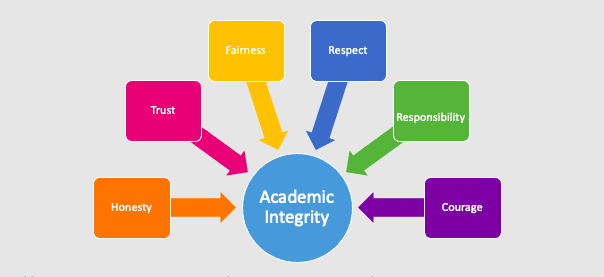Published on: 10/07/2023 · Last updated on: 03/09/2024
What is academic integrity?
Academic integrity is the ethical policy or moral code of academic study. It describes a shared commitment to six fundamental values in earning, teaching, and research in UK higher education and beyond. These values provide a practical and positive framework of expectations shared between students and staff. It is essential that staff and students all understand and adhere to these values.
Action on Academic Integrity at the University of Bath
In 2022 the University of Bath signed-up to the QAA Charter on Academic Integrity. This ‘represents an institutional pledge to implement its principles and commitments which include working with staff and students and, in collaboration across the sector, to protect and promote academic integrity, and take action against academic misconduct’ (QAA).
The University has established an Academic Integrity Working Group which meets regularly to discuss emerging issues and support the development of policy and practice across the institution. For more information you can contact the Co-Chairs, Alan Hayes and Briony Frost.
The six fundamental values of Academic Integrity

Honesty means we, as staff, expect students to be truthful about which ideas are their own and which belong to, or are derived from, other authors. We also expect the methods and results of their experiments and research to be genuine and interpreted truthfully. Learners should show awareness of potential biases and declare any conflicts of interest. Students should also be able to expect the same honesty from academic staff. Mutual honesty supports a community of trust.
Trust requires a reciprocal relationship between all members of a learning community. It means that staff should set explicit assessment guidelines, provide transparent marking criteria, timely feedback and feedforward, and signpost students to accessible channels of support. Students should commit to preparing and submitting their own work honestly and actively avoid acts of deception. Staff should also be confident that they are working within a transparent departmental process within a rigorous and reasonable university-wide regulatory system. Students should also be confident that their peers are not intending to cheat, or inciting others to cheat. The University is expected by both staff and students to take appropriate action to mitigate and respond to acts of misconduct in a timely and fair manner.
Fairness depends on the institution to produce and communicate clear expectations of academic standards and conduct. We must enable students to identify and apply the necessary skills and behaviours to meet those expectations. When required, appropriate members of staff should impartially and even-handedly apply the disciplinary procedures for misconduct. Both students and staff should respect and depend on those empowered to take action and provide support related to academic misconduct.
Respect is both mutual and multifaceted. It should be applied equally to others, and to oneself, regardless of differences in race, nationality, age, sex, gender, sexuality, class, or other elements of distinction across backgrounds, identity, and political affiliation. It includes, but is not limited to, valuing a diversity of opinions and appreciating the need to challenge, test, and refine ideas and approaches.
Responsibility is shared by all. Academic integrity depends on every student, academic, and administrator to safeguard quality and standards in higher education so that those who cheat do not enter the workforce “without the necessary skills, knowledge, and competenc[ies]” to work in their field (QAA). It is up to each individual to familiarise themselves with what academic integrity is, what the expectations are, to adhere to those expectations, and to call out behaviour that contradicts these values by reporting to the appropriate persons. Taking responsibility requires personal courage and depends on the courage and commitment of other individuals too.
Courage is required to live up to these values every day, even when it seems that doing so could come at personal cost, such as failing an assignment or reporting a friend or colleague for misconduct.
Training and support for students
The University provides resources to support students throughout their degrees and include training on referencing and avoiding plagiarism, critical thinking, and reading and note-making. Staff can also make use of the video library to support students with their assessments. Find out more about Skills For Study and Cite Them Right.
Guidance is also provided for students on academic misconduct in exams.
All students are required to undertake and pass an Academic Integrity Initiative Test. This is intended to provide every student with a common minimum baseline of skills and knowledge of good educational and academic practice at an early stage, and thus assist them in preparing assignments while avoiding inadvertent assessment offences, particularly plagiarism. For full details see the University’s Academic Integrity Training and Test webpage.
The Library provides a guidance on referencing, including citing images, using Harvard Bath and other referencing systems, and using referencing software, as well as videos and short guides on how to avoid plagiarism. Visit the Library webpages for more information.
The Skills Centre runs a Skills Hub which provides opportunities for students to develop study skills an increase confidence in taking notes, thinking critically, writing academically, presenting professionally, using mathematical tools and techniques, and enhancing digital skills. Visit the Skills Centre webpages for more information.
Training and support for staff
Full description of University’s procedures on Examination and Assessment Offences (QA53) and Regulation 15, Assessment of undergraduate and taught postgraduate programmes are available to consult.
The QAA has provided a collection of Inclusive and Accessible Academic Integrity Teaching Resources that staff can use with students, or with other staff as training materials.
Further areas of guidance are provided below. These are not exhaustive, and not all will necessarily apply to your own context. Please contact the Curriculum Development team if you’d like to discuss how to apply these ideas more specifically in your situation.